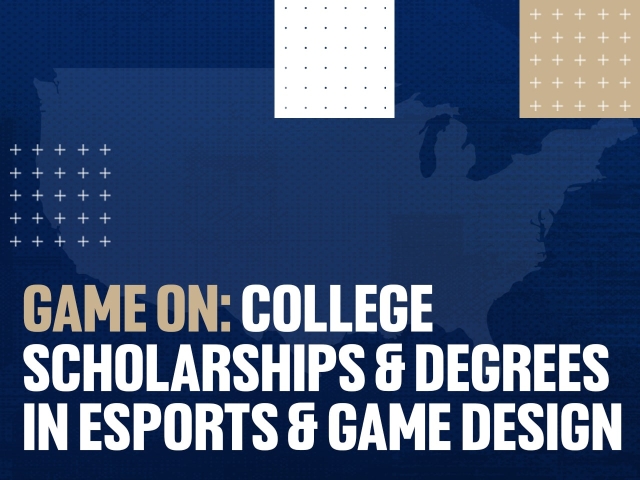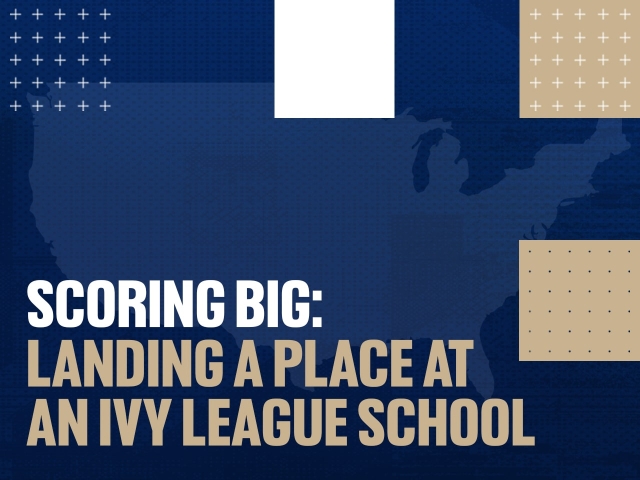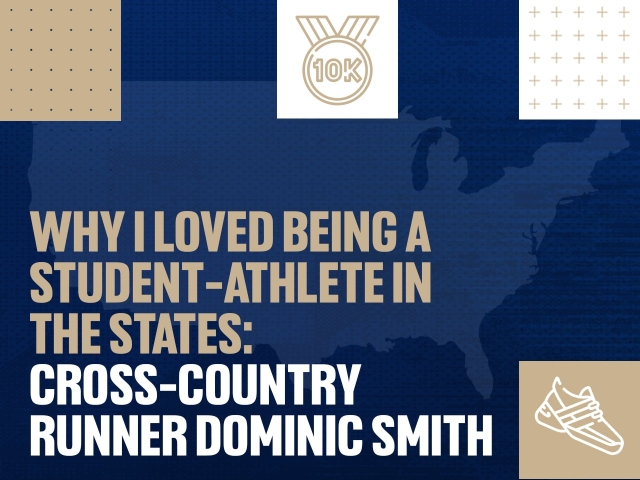For aspiring student-athletes, the dream of combining top-tier academics with high-level athletics often leads to one destination: the Ivy League. These world-renowned institutions, famed for their academic excellence, rich athletic traditions, social prestige and influential alumni networks, offer an unparalleled opportunity to excel both on and off the field.
Navigating the complex admissions process, particularly when seeking to combine academics and athletics, requires meticulous planning and execution. While the popular perception paints a picture of flawless students with impeccable credentials, the reality is far more nuanced. Ivy League schools aren't seeking cookie-cutter perfection; they're searching for individuals who possess a unique blend of intellectual curiosity, impactful contributions, and authentic passion.
Our latest blog post will serve as your playbook to kick off your journey, outlining some of the steps, strategies, and insights needed to increase your chances of securing that coveted Ivy League acceptance letter.
Understanding the Ivy League Landscape
The Ivy League comprises eight private universities and some of the best-known academic institutions in the world: Harvard, Yale, Princeton, Columbia, Brown, Dartmouth, the University of Pennsylvania (Penn), and Cornell. The Ivy League is also an athletic conference that officially began in 1954, although the Harvard v Yale sporting rivalry dates back to 1852 when their respective rowing teams first competed against each other.
With an alumni ranging from US Presidents, global business leaders, CEOs, and groundbreaking academics and scientists, who have shaped and continue to shape the world, these institutions are known for their exceptionally low acceptance rates, often hovering in the single digits.
For the class of 2027, for instance, acceptance rates ranged from approximately 3.4% at Harvard to 8% at Cornell, with around 425,000 applicants across the eight Ivy League schools each year, including 56,900 for Harvard alone.
These figures highlight the highly competitive nature of Ivy League admissions. It’s far from easy to make the cut, but if you do achieve the holy grail, you are laying the foundations for a truly life-changing opportunity.
The Athlete Advantage (But It’s Not a Guarantee)
While Ivy League schools do not offer "athletic scholarships" in the traditional sense, they do provide significant financial aid based on demonstrated need. Athletic ability can be a substantial "hook" in the admissions process with student athletes benefiting from early academic reads, early financial aid estimations and potentially “coach assisted admissions” but it's crucial to understand that it's not a golden ticket.
Recruiting Process: Ivy League coaches have a limited number of "recruiting spots" each year. These spots are highly coveted and reserved for athletes who demonstrate exceptional talent – whether you’re an elite track athlete or a national field hockey star, combined with that all important strong academic profile. Coaches may engage with the most talented prospects up to two years prior to their university start date but of course only if their academics are on a great trajectory. It’s important to note that Ivy League universities compete at NCAA DI level and in many cases are making NCAA National Championships finals, meaning athletes aspiring for Ivy League teams will need to have DI level talent.
Academic Excellence: Ivy League schools prioritize academic rigor above all else and Ivy League coaches will arrange for the student-athlete’s high school transcripts and SAT/ACT scores to be sent to their admissions department before the application process even opens for traditional/non-athlete students. An admissions panel will sit to review the full profile of the recruit including high school transcripts and curriculum, SAT/ACT scores, personal statements, achievements and extracurricular activities. This will allow coaches to feedback helpful insights to the student athlete such as what increase in SAT/ACT score will be required and whether their GPA will need to increase in the next academic year prior to application.
"Likely Letters": If the admissions office deems the student-athlete proposed by the coach for assisted admission to be academically qualified, they may receive a "likely letter" indicating a strong chance of acceptance. These letters are sent in advance of the application deadline so the student-athlete can correctly file the final application paperwork in the knowledge he or she is highly likely to be accepted on the official notification date.
The Key Components for Ivy League Admissions:
There are generally five key factors that will determine the success of your Ivy League application, and we’ll summarise each one to highlight what’s required along the way.
- Academic Performance
- Test Scores
- Personal Essays
- Extracurricular Activities and Achievements
- Letters of Recommendation
Academic Performance
Ivy League schools expect you to have an excellent GPA, and a score of 3.85 or higher is typically a prerequisite for a student athlete to be considered. Admissions officers will look at rigour and balance of subjects you have taken from year nine onwards and look for an upwards trajectory in performance year on year. To achieve a GPA of 3.85+ students will need a grade profile of mostly straight A’s, perhaps allowing for 1 to 2 B grades at worst.
Test Scores
We recommend any student aspiring for an Ivy League school takes the SAT or ACT. The maximum SAT score is 1600 and students being accepted into Ivy League schools are attaining very high scores, from 1450 upwards. With the option of taking your test multiple times, continually improving to achieve the best score possible is advised. Ivy League coaches will want prospects to have achieved a suitable score ideally one year in advance of the university start date.
While the requirement for SAT/ACTs changed during the Covid pandemic, they are now mandatory again for Brown, Dartmouth, Harvard, Penn and Yale University, and for Cornell for Fall ’26. Columbia and Princeton are test optional for the 2025 admissions cycle.
|
University |
Average Composite SAT Score |
Average Composite ACT Score |
|
Brown University |
1515 |
33-35 |
|
Columbia University |
1520 |
33-35 |
|
Cornell University |
1505 |
32-35 |
|
Dartmouth College |
1500 |
32-35 |
|
Harvard University |
1530 |
33-35 |
|
University of Pennsylvania |
1525 |
33-35 |
|
Princeton University |
1515 |
33-35 |
|
Yale University |
1530 |
33-35 |
*These averages are based on the entire student intake although small allowances may be made for student-athletes e.g. a world class student athlete with a 1450 SAT may still be admissible.
Personal Essays
In an Ivy League application, the personal essay serves as an insight into the applicant's unique identity and personality, looking beyond your academic transcripts and test scores. It is an opportunity for a student to be authentic, showcase their writing ability and creative expression, highlight their passions and experiences, demonstrate their fit for the university. It gives you the chance to create a lasting expression and reveal your ‘why’ or ‘purpose’.
Crafting a compelling personal essay could be the deciding factor that makes an individual standout in a sea of high-achieving applicants and can highlight why you will make an outstanding student for their institution.
Extracurricular Activities
Strong extracurricular activities are vital in an Ivy League application because they showcase a student’s commitment to other areas of life beyond academics and demonstrate a more rounded individual, with the potential to contribute to wide society and or university campus life. They provide an opportunity to highlight your passion for specific interests and causes, show your work ethic and willingness to go the extra mile, and portray your contribution to the wider community.
When articulating your extracurricular activities, you should consider:
Leadership and Initiative: Meaningful extracurriculars often involve taking on leadership roles, initiating projects, or contributing significantly to a team or organization, illustrating valuable personal qualities.
Character and Values: Provide insights into your character, work ethic, and values, demonstrating how you spend your time and what you prioritize.
Impact and Contribution: Illustrate your ability to make a positive impact on your school, community, or even a broader scale, showing you are capable of being a contributing member of the university community.
Unique Talents: In a pool of academically gifted students, strong extracurriculars help you stand out by showcasing unique talents, experiences, and contributions.
Provide Context for Academic Achievement: Demonstrate how you balance academic work with other commitments, showing time management and dedication.
Indicate Potential for Future Success: Offer a glimpse into your potential to continue making significant contributions and drive positive change in the world.
Letters of Recommendation
Ivy League Universities will typically require one school recommender and one community-based recommender.
Letters of recommendation serve as crucial third-party endorsements in your Ivy League application, offering admissions officers a perspective beyond your own self-presentation. These letters provide valuable insights into an applicant's character, work ethic, and intellectual curiosity, painting a more holistic picture of your potential.
A compelling recommendation goes beyond simply listing accomplishments; it offers specific observations that promote the applicant's unique qualities and contributions. For example, this could be from a teacher or mentor who has witnessed your development as a student; a leader you have worked with outside of school; a sports coach who has been involved in your athletic development or you have helped with in volunteer coaching.
These letters lend credibility to the applicant's claims, providing evidence of their impact and potential to contribute to the wider community, and can often be the deciding factor in distinguishing a strong candidate from a merely good one.
Timelines
Every Ivy League University uses the Common App tool for applications and students will be able to view various deadlines on the Common App tool. This is a free to download application.
Applications open for the Fall 2026 University intake on 1st August 2025 with the first deadline falling at the end of October. This deadline is for a student’s “Early Decision” choice of university i.e. the university they are willing to fully commit to attend if accepted.
In selecting a university “Early Decision”, the student is agreeing to withdraw all other applications if accepted. Notification of acceptance will be mid November 2025. Keep in mind that student-athletes being recruited by a coach for assisted admission will however have been in contact with the coach well in advance of this deadline and may have already received a “likely letter.”
“Early Action” is a college application process that allows students to apply to multiple colleges at the same time, typically by November or December and receive admission decisions by January or February. Students are not obligated to attend if accepted.
“Regular Decision” is the standard way most traditional students apply to college. You submit your applications by a set deadline, usually in January and then play the waiting game until March or April when schools send out their decisions. With coaches recruiting athletes up to 2 years in advance student athletes will often be committed in the Early Decision round of applications.
Your Personalised Ivy League Strategy
In summary, to plan your Ivy League strategy, you should:
- Start Early: Begin planning and preparing as early as possible, ideally in middle or early high school. Keep in mind coaches can engage with athletes from June of their GCSE year and early engagement leads to greater potential for useful feedback.
- Develop a Holistic Approach: Create a comprehensive strategy that encompasses athletic and academic excellence, extracurriculars, essays, and recommendations.
- Showcase Your Authenticity: Let your true personality shine through in your application materials and recruitment discussions with coaches
- Seek Expert Guidance: Consider working with an experienced admissions advisor who can provide personalized support. FirstPoint USA’s Talent Managers can present athletes to appropriate to Ivy league coaches to help secure assisted admissions and our Head of Admissions can help students navigate personal essays and letters of recommendation.
- Be Proactive: Take control of your application process, stay aware of all deadlines, act on feedback and demonstrate your genuine interest in your target schools.
By embracing a personalised approach, highlighting your unique strengths, and showcasing your passion and commitment, you can increase your chances of achieving your Ivy League dreams.
FirstPoint USA Ivy League Alum
We have placed several talented athletes at Ivy League schools across different sports in recent years, including:
· Brown University: Joe Al-Hasso and Isaac Frost (both Rugby)
· Cornell University: David Browning: (Soccer), Rethin Senthil (Tennis),
· Dartmouth University: Andoni Georgiou (Soccer)
· Harvard University: Yannick Kraus (Track & Field), Bill Chan (Tennis)
· Princeton University: Ava Dempsey, Anna Faulstich and Caitlin Thompson (all Field Hockey)
· Yale University: Imogen Davies (Field Hockey)
Outwith the Ivy League schools, FirstPoint also works closely with coaches from some of the most prestigious academic and athletic universities, including the likes of UCLA, Stanford, Cal-Berkeley and Notre Dame.
You can also watch our recent webinar with Yale University's Director of Rugby, Craig Wilson who shares some of insights on life as an Ivy League student-athlete and Yale's recruitment process.
Conclusion
Landing an Ivy League admission is a challenging but attainable goal. By combining academic and athletic excellence, proactive communication, and meticulous planning, you can significantly increase your chances of success. Remember, the journey is as important as the destination. Embrace the challenges, learn from your experiences, and strive to reach your full potential.
This journey requires dedication, perseverance, and a strong support system. By following this roadmap and maintaining a relentless pursuit of your goals, you can position yourself for success in the highly competitive world of Ivy League applications. If successful, the rewards will be more than worth the effort.




